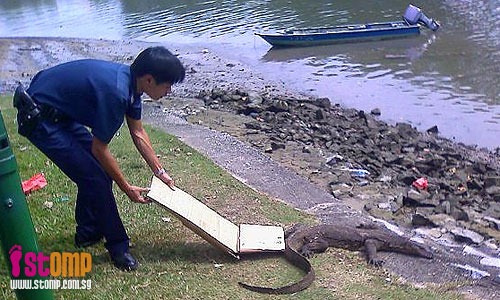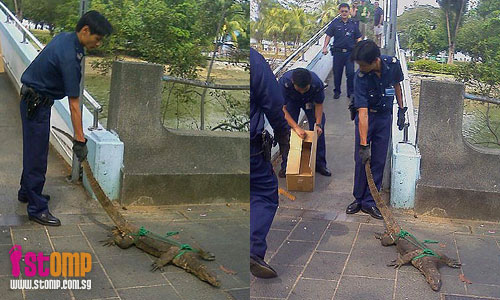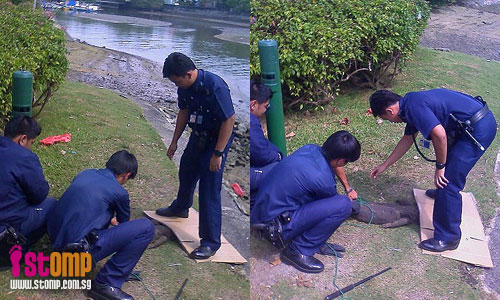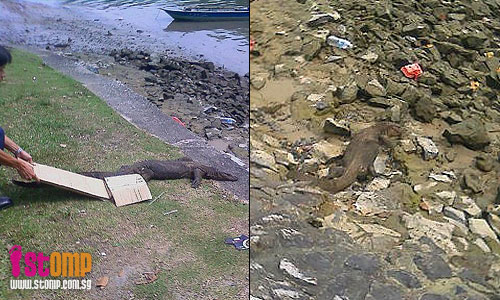
A huge Malayan Water Monitor lizard was illegally caught, tied up and was waiting to be transported out by poachers in the Changi area, and Nature Trekker Singapore's founder Ben Lee advises the public to report such cases to the police
Nature Trekker's administrator, John, sent STOMP an email with the story:
"Mr Lee has received a report that a water monitor lizard was illegally captured at Changi Point last January 11.
"The illegal trapping involved a 7-foot long reptile that was tied up and waiting to be transported out by the poachers. These animals usually end up in the slaughter house for sale as exotic delicacy at some unlicensed eatery stalls and restaurants. Fortunately, the captured lizard was rescued by the police and was released back into the wild after a tip-off.
"According to Mr Lee, who studied natural history of Singapore for the past 30 years, that this gentle lizard is totally harmless and co-exists well with humans. This type of lizard can grow up to 3 metres in length as a full grown adult. It is mainly terrestrial in nature, a good tree climber and an excellent swimmer - where a part of its name came from. It also dives well in search for food or to escape predators. It feeds on fish as well as small animals and is often found scavenging for food leftover. This specie can be found in beaches, scrublands, forests and in mangrove areas along in Kranji and Sungei Buloh.
"Mr Lee would like to seek the public's help to report any poaching or illegal trappings of such lizards or any other wild animals to relevant authorities such as AVA, Nature Trekker Singapore, Nparks or the police.
"The Park Policing Unit under Nature Trekker Singapore was formed in collaboration with Nparks to address issues on illegal activities such as poaching, fish netting, bird trapping or any illegal activities detrimental to wild animal livelihood and survival.
"Anyone will deal with the law if caught attempting such illegal capture of wild animals like this lizard. We are hoping that this report will create awareness about their protection."
Nature Trekker Singapore's hotline is 6300 6000.



Related post: Lizard crawls out from Chinese Garden pond. So huge, it looks like crocodile! (8th January 2009)
Related post: Cute lizard makes Siloso waterfall its Everest (30th January 2009)
Kudos to the members of Nature Trekker for helping to curb poaching of wildlife. It's always very distressing for me to hear of poaching, especially as far as endangered species are concerned. While the Malayan water monitor (Varanus salvator) is far from endangered here in Singapore, there certainly is no need to depend on wildlife as a source of food. I'm always worried that wildlife poached in Singapore might just end up in the exotic wildlife markets in the region, whether as pets or for meat. If wildlife populations in neighbouring countries are depleted due to overharvesting, poachers might set their sights on Singapore. I fear what will happen if that day should ever come.
I do wonder if this particular act was perpetrated by foreign workers unaware of the laws which prohibit the capture of wildlife:
Under the Wild Animals and Birds Act, it is an offence for any person to kill, take or keep any wild animal or bird, other than those specified in the Schedule such as mynas, pigeons and crows, without a license. Any person found doing so shall be guilty of an offence and shall be liable on conviction to a fine not exceeding S$1,000 and to the forfeiture of the animal.
The full text of the Wild Animals and Birds Act can be accessed here via the Agri-Food and Veterinary Authority (AVA) website.
The full list of species specified in the Schedule consists of common birds; these are the house crow (Corvus splendens), feral pigeon (Columba livia), Javan mynah (Acridotheres javanicus), common mynah (Acridotheres tristis), Asian glossy starling (Aplonis panayensis), and purple-backed starling (Sturnus sturninus). The house crow, feral pigeon, Javan mynah and common mynah are all ubiquitous non-native species found in urban areas throughout Singapore. The Asian glossy starling is a very common native, while the purple-backed starling is a migrant found in great numbers during the right time of the year.
Hence all other species of wildlife are protected under the Wild Animals and Birds Act.
This particular monitor lizard was fortunate. I'm sure there are plenty of other creatures out there that did not have such a lucky fate at the hands of poachers.